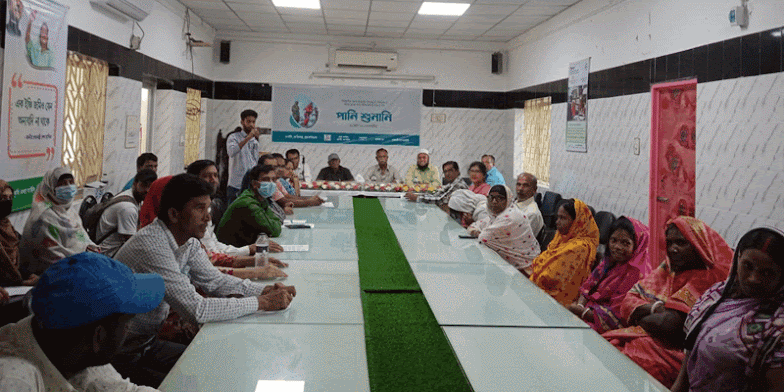 |
| World Water Day 2023 |
On the occasion of World Water Day 2023, a water hearing was held in Satkhira on Wednesday, March 22, 2023. Organized jointly by SoDESH-Satkhira, Participatory Research and Action Network-PRAN, and ActionAid Bangladesh under the water rights campaign Watermove Campaign, the hearing was attended by communities affected by the supply water crisis, civil society activists, media workers, NGO representatives, public representatives, climate and water crisis in coastal areas. People under 50 and above participate.
District Agriculture Extension Directorate (Khamarbari) Engineer Md Harun Or Rashid, Member Secretary of District Civic Committee and prominent journalist, former president of Satkhira Press Club Abul Kalam Azad, former principal of Satkhira Government College Educationist Abdul Hamid and Sadar Upazila Department of Public Health and Engineering spoke as the chief guest on the occasion. Engineer Mofizur Rahman. Social and political personality Sheikh Azahar Hossain presided over the event moderated by SoDESH Executive Director Madhab Chandra Dutta.
In the implementation of SoDESH-Satkhira under the financial support of the donor organization ActionAid Bangladesh and the overall management of the development organization PRAN, Govind Munda, fisherman of Kalinchi village of Shyamnagar upazila, raised his problems on behalf of those affected by the shortage of fresh water, father: Subal Munda, Rozina Akter Jhuma of Tala upazila. Daily laborer Sukumar Das of Pratapnagar of Asashuni upazila, Social activist Shefali Begum of Datinakhali village of Shyamnagar uzella, Sharmin Sultana, a college student of Asashuni upazila.
Journalist and development worker Farooq Rahman, development worker Lewis Rana Gain, Shyamal Kumar Biswas Mahua Manjuri, journalist Asaduzzaman, Ahsan Rajib journalist and Asaduzzaman Sardar, Dalit leader Gaurpad Dutta, and others participated in the free discussion. Men and women of the community presented testimony on behalf of the people affected by the water crisis at the water hearing. They share their personal experiences of how the freshwater crisis is affecting their livelihoods. Ashashuni, Tala, and Shyamnagar Supeyas of the district face a severe shortage of drinking water, and the sweet adhar ponds have now become salty.
Narrating their struggle to collect the daily water required for survival, they said, An Tara. The drinking water crisis in coastal/Satkhira has intensified over time due to climate change and man-made factors, which has a direct impact on people's lives. These include spending extra time traveling long distances to collect water, physical ailments due to carrying heavy water storage containers like pitchers, and drums, forced drinking of salty and contaminated water resulting in high blood pressure, abdominal pain, health risks like heart disease, infant mortality, pregnant women Seizures, premature abortions, and high blood pressure, etc. crisis. In addition, households are burdened with additional costs in treating salinity-related illnesses and purchasing essential drinking water.
Other speakers present at the event said that all fundamental rights are closely related to clean water. The hearing provided an opportunity to learn directly from the affected communities how the insecurity of fresh water is affecting other basic rights of the coastal communities of Bangladesh, which can play an important role in future planning. They urgently demanded to take timely initiatives on the basis of region-based crisis, considering the advantages and disadvantages of the local people as a priority to ensure the supply of water for everyone and daily activities. Men and women living in the coastal region of Satkhira district, students, journalists, NGO workers, Dalits, politicians, government officials, public representatives, and people of various professions participated in the entire program.
In the discussion meeting, the leaders said that due to climate change in the Satkhira coast, people are constantly struggling to survive by collecting fresh water. Climate change has created natural, agricultural, food, health, and clean water crises. Different types of family and social conflicts are being created in the area every day based on the water crisis. Adaptation practices of local communities around the crisis are also diverse. Along with the adverse effects of climate change and the struggle of coastal people, the rice, fish, trees, birds, and wild animals that existed in the area have now disappeared. The disaster register of the area has also changed.
Comments